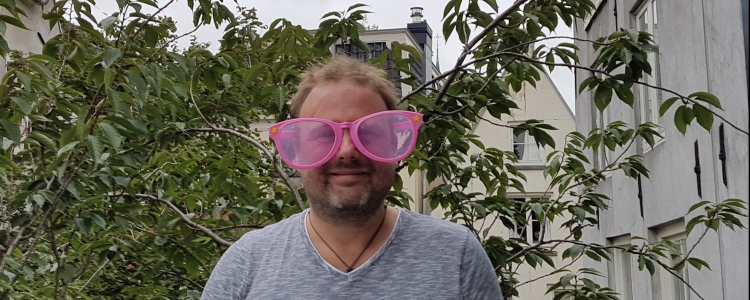Could optimism lead you quickly to failure? When it comes to speaking Dutch, then unfortunately the answer is yes 🙁 Certainly if you are too optimistic, then it could cause you too fail, sooner than you ever imagined. On the other hand, optimism by itself is not a bad thing… You just need to know how and when to use it…
Let’s just start with pure pessimism…. When the beginning is awful then things can only get better, right? So let’s start with some awful things, so that later on we can move to positive things, including some optimism 🙂
There are 3 forms of misplaced optimism!
So let’s start with a pessimistic view first…. Many people that come to the Netherlands do play with the thought that somehow life could be nicer if you speak the Dutch language. Many people sign up for a language course, but… when it comes to speaking Dutch, the vast majority of all people will miserably fail. So what could be the main reason? The answer is, unfortunately in many cases, a misplaced overdose of optimism 🙁
First of all, most people underestimate what language really is, and what you really need to master. Many people say things like: I just want to talk about simple things, say hello, go to shops and that kind of things. Although it looks reasonable, there is one great problem here… Paradoxically enough the simplicity of your subject does not say anything about the simplicity of a new language and your skills to express the things that you want… Even simple situations require your ability to put sentences together, choose the right word and understand things when people talk back to you…. Feeling at ease is another thing… Certainly this last thing will take some practice…
Many people believe that if you just memorize some sentences, then this will do the trick. Hallo in Dutch is hello and goede morgen is good morning, so there is every reason to believe that the rest will automatically follow, right? Unfortunately, this is not the case…
Simple conversations are not always that easy
 Even for simple conversations, you need to do certain things that require learning and understanding. First of all, you have to learn new words. Then the order in the sentence is different from English and this thing alone can really confuse you. To make it even worse, even if you recognize words that sound or look familiar to you, chances are high that the meaning is slightly different. Now you understand how easy it is not to understand anything at all in simple conversations! On top of that you may have to train your mouth and your throat as well to give everything that you say the right pronunciation….
Even for simple conversations, you need to do certain things that require learning and understanding. First of all, you have to learn new words. Then the order in the sentence is different from English and this thing alone can really confuse you. To make it even worse, even if you recognize words that sound or look familiar to you, chances are high that the meaning is slightly different. Now you understand how easy it is not to understand anything at all in simple conversations! On top of that you may have to train your mouth and your throat as well to give everything that you say the right pronunciation….
Let’s make it even worse now… not do people only underestimate what language actually is, on top of it they also tend to overestimate the time or effort that it will take them to master a new language. Many people that sign up for a language course genuinely believe that dedicating two hours per week after work will do the trick… What would you think? Is this pure optimism or plain stupid?
Do you really think you are that smart?
Let’s have a look at babies or little children. They seem to learn new languages almost in an effortless way. But… just be honest now…. how much time do they have to be exposed to a new language? More than once a week, right? Here is another question… how well did you master your own language when you were let’s say 10 years old? Sure…. you spoke your language as a native speaker, but… at that age you were not able to function at all levels….
Can you see how easy it is to have unrealistic expectations when you start with underestimating the complexity of language and then when you give yourself 2 hours per week to master it? But… unfortunately, there is still a third form of optimism that is far more insidious and… often it is invisible… It often happens when you feel that you are already speaking lots and lots of Dutch, so therefore this is a very mean one… It is just one thing that could make you stumble….
This forn of optimism can stop you even more…
The third form of misplaced optimism is that most people think that they know much more then they actually do… The reason is simple. If you think that you understood everything in Dutch, then you’ll have a sense of accomplishment and you’ll feel good about yourself. But… here is the bad thing… even if you think that you what you understood, it does not have to be the case. On top of this, also many things that you say in Dutch, may sound logical and great to you, but chances are high that you make more mistakes than you could ever imagined…. Just for your information… it happens to many Dutch people… they often like to think they already know everything about this language…
Here is another tragic thing… When people start with too much optimism, this is what often happens. Very soon they discover that speaking Dutch is not that simple at all and then you can already guess what happens…. They immediately flop to the other extreme side of deep optimism and despair. Now they believe that they will never ever be able to learn it… It is a mechanism that has killed many Dutch language dreams…
But… let’s get a bit more optimistic now… Too much doom and gloom about speaking Dutch, don’t you think? Luckily there is also lots of positive news…. And… we need to be honest and objective now…. if you know how to use it, optimism can also be your greatest friend when it comes to speaking Dutch!
Optimism can be a great friend, if you know how to use it wisely!
So how can you embrace optimism and still learn and speak Dutch like crazy? Actually it is quite simple…. Be honest. Be objective. Just look at Dutch and see how it really is. Then look at yourself and know yourself… give yourself time and most important… always be kind to yourself! Be your own best friend if you want to learn something new…
So, if somehow you felt disappointed with your results then simply asked if you had some misplaced optimism or unrealistic high expectations. If so, change it, but… use all the optimism that you can find, while remaining realistic…
Let’s put it like this… Imagine that you like to climb a mountain. First of all you just acknowledge how high the mountain actually is. Don’t pretend that it is only 20 meters high when the altitude is 2000 meters. Then decide whether or not you like to climb the mountain. You may like to reach the top for so many different reasons. Maybe you like the view, or maybe you like that sense of accomplishment. And then it is actually very simple… Just see objectively what you need to do to climb that high and then go for it! Start climbing and don’t stop. Also, if you like to enjoy your time while climbing make sure that you use the right tools and… don’t complain too much…. just think of that beautiful top you like to reach!
But… here comes the great thing… if you truly enjoy your adventure of climbing the mountain then you may have a great time already even if you have not reached the top yet… On the way, there are so many things that you could enjoy already… Maybe it is nature or the spectacular views…
The same thing is true when you want to speak Dutch. Within a couple of days you can reach certain levels already that will definitively put you in a great mood. Once you know how to learn and to speak Dutch, the most important thing is that you just continue the good work. Keep walking and don’t stop!
Here is another tip… always allow yourself to make many mistakes. Actually, every mistake that you make is a stepping stone to more success. Therefore, if you said something wrong in a conversation, feel good about it! Now you learned something new! If you are open to making mistakes you’ll soon realize that learning is a lifelong thing and that you get better at things as long as you practice 🙂
Another important aspect is time. Give yourself plenty of time, certainly in the beginning. If you focus on Dutch for a couple of days in a row, you’ll learn far more than if you try to do it 2 hours per weeks for 10 months. Also, if you would really like to use Dutch on a high professional level, then make sure that you start as quickly as you can….
Let’s end with even more optimism… Just know that great things are possible. You can learn more Dutch than you ever imagined, as long as you are honest and objective. Don’t underestimate Dutch and don’t overestimate yourself… See what it really takes and then go for it! Take your time and embrace a new adventure! It might be a good idea to be less optimistic than the average person in the beginning and then use patience and daily practice and playing. And then… strangely enough one day you’ll realize that you achieved much more than you could ever imagine… So at the end, things can really work out for you…. and that is a comforting and optimistic thought, don’t you think?






